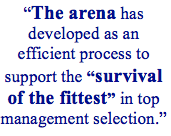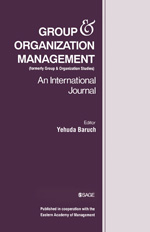The ‘Arena’ of Top Management Selection
Editor’s note: We are pleased to welcome Claartje J. Vinkenburg of VU University in Amsterdam. Her paper “Arena: A Critical Conceptual Framework of Top Management Selection,” co-authored by Paul G. W. Jansen of VU Amsterdam, Nicky Dries of KU Leuven, and Roland Pepermans of VU Brussels, is forthcoming in Group & Organization Management and now available in the journal’s OnlineFirst section.
 As a scholar of diversity and careers, I have long been fascinated by pathways to the top and how the labyrinth appears to be much less complicated to navigate for White, fit, 40-something men than others in practically any type of organization or profession. Over the years I have shifted focus from the individual to perceptions to the system in terms of trying to explain this phenomenon. The selection process by which some people end up in top positions and others do not is largely uncharted territory, even if it resonates with academics and practitioners alike. Conceptualizing that process as an arena and bringing together relevant theories and empirical findings from different fields was a major challenge, but a journey I much enjoyed.
As a scholar of diversity and careers, I have long been fascinated by pathways to the top and how the labyrinth appears to be much less complicated to navigate for White, fit, 40-something men than others in practically any type of organization or profession. Over the years I have shifted focus from the individual to perceptions to the system in terms of trying to explain this phenomenon. The selection process by which some people end up in top positions and others do not is largely uncharted territory, even if it resonates with academics and practitioners alike. Conceptualizing that process as an arena and bringing together relevant theories and empirical findings from different fields was a major challenge, but a journey I much enjoyed.
 The largest surprise to me was that there was indeed very little to go on in terms of empirical evidence on top management selection, even if there is a lot of experience on this topic among management development professionals and executive searchers as well as numerous career stories from incumbents of top management positions as evidenced in biographies, movies, and other popular sources. The main reason for the lack of research on top management selection I think is because this is a very small and very inaccessible population to study, with accounts of selection decisions only available in retrospect rather than in vivo.
The largest surprise to me was that there was indeed very little to go on in terms of empirical evidence on top management selection, even if there is a lot of experience on this topic among management development professionals and executive searchers as well as numerous career stories from incumbents of top management positions as evidenced in biographies, movies, and other popular sources. The main reason for the lack of research on top management selection I think is because this is a very small and very inaccessible population to study, with accounts of selection decisions only available in retrospect rather than in vivo.
I hope our conceptualization of top management selection as an arena, which is inherently different from regular selection at lower organizational levels, with its own unique structural conditions, situational components, and cognitive features, inspires further qualitative and even ethnographic research on how this type of selection plays out across different contexts and that insights thus gained may lead to an improved, more inclusive selection process for top managers.
Read the paper, “Arena: A Critical Conceptual Framework of Top Management Selection,” online in Group & Organization Management.
Claartje Vinkenburg is associate professor of organizational behavior at the Amsterdam Center for Career Research, VU University. Claartje’s research focuses on (gender) diversity in careers, especially in science and in professional service firms. She has published in the Journal of Social Issues and Leadership Quarterly, and edited a book on “Top potentials” for the Dutch Foundation for Management Development with Roland Pepermans.
Paul Jansen is full professor of industrial psychology at VU University, and gradu – ated, cum laude, in 1979, in Mathematical Psychology at the University of Nijmegen. His research interests are in management development, careers, assessment, and performance management. Paul Jansen has published in the Journal of Applied Psychology, Journal of Organizational Behavior, Journal of Vocational Behavior, and Journal of Management Studies.
Nicky Dries is a research professor at KU Leuven. She was a visiting scholar at VU Amsterdam, Tilburg University, WU Vienna, Reykjavik University, and Boston University. Nicky is on the editorial board of Journal of Vocational Behavior and European Journal of Work and Organizational Psychology. Her research interests are talent, human potential, and subjective success. She is an active member of the 5C and the Career Adaptability/Life Design project.
Roland Pepermans is full professor at the Vrije Universiteit Brussel, work & organizational psychology. He teaches Organizational Behavior, Managerial Psychology and Human Resource Management. His research relates to social exchange processes at work in profit and non-profit organizations, with applications to high-potential management as well as to volunteering.






















































































